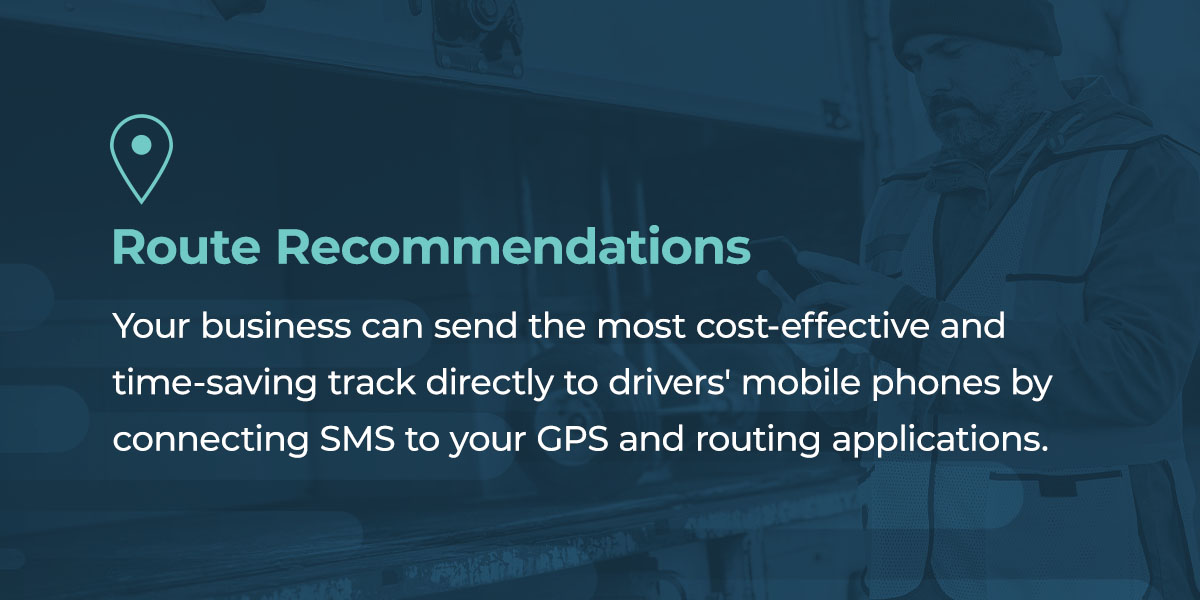
How Fleet Managers Use SMS API Integrations
Fleet management is fast-paced and involves many moving parts. Managers must communicate effectively and coordinate with drivers to keep operations running smoothly. With so many responsibilities, leaders need tools that help them juggle these duties and provide reliable, efficient transportation services.
Fleet managers can leverage short message service application programming interface integrations in various ways to support their daily business processes, ultimately achieving higher operational efficiency.
This guide explores how to use SMS API integrations and the many benefits you can take advantage of with these solutions.
What Are SMS API Integrations?
An SMS API integration is a bridge, allowing a text messaging service to connect and communicate with other software applications or platforms.
These integrations allow your software solutions to communicate and exchange information via text, adding value by boosting driver communication and automating time-sensitive updates.
Benefits of Using SMS API Integrations
Fleet managers can reap many advantages from using SMS API integrations.
- Streamline communications: These integrations allow fleet managers to message drivers for improved oversight and transparency.
- Automate workflows: Automatically send notifications, reminders and updates by connecting your software systems and applications, reducing manual effort and boosting productivity.
- Enhance driver efficiency: SMS API integrations help managers implement updates and respond to challenges in real time, optimizing efficiency and staying proactive.
- Improve fleet performance: System integrations allow fleet managers to identify opportunities to improve operational performance for drivers and vehicles.
- Enjoy data insights: API integrations make it easier for managers to collect and analyze essential data about their fleet’s performance. These insights can inform decision-making and support optimization.
SMS API integrations help fleet managers maximize their systems and supercharge communication channels.
7 Ways Fleet Managers Can Use SMS API Integrations
Explore these ways managers can capitalize on SMS API integrations.
1. Real-Time Updates
Critical events can happen anytime on the road. A significant perk of SMS API integration is the instant ability to reach your drivers to share relevant notifications and alerts.
On average, people read 60% of text messages within the first five minutes of delivery. Whether there is a vehicle breakdown, a collision or a traffic delay, sending a message to your drivers’ mobile devices can help them make informed changes to promptly address or mitigate an issue that could impact performance.
Fleet managers can also use SMS to share delivery schedule changes and information about new assignments, keeping drivers in the loop and giving them time to prepare for what’s next.
2. Delivery Confirmations
Another excellent way to use integrations to enhance fleet management is having drivers share delivery verification as they proceed through their workday. Confirmation messages allow businesses to monitor progress and share timely updates with customers waiting on their packages.
SMS also makes it easy to keep a detailed record of successful deliveries for each driver. Fleet management systems can automatically process confirmations and update delivery status without requiring the time or energy for manual data entry.
3. Route Recommendations
Integrating SMS APIs with your business’ routing and dispatching systems can significantly optimize your drivers’ daily routes. These systems use data to determine the most efficient courses to improve productivity, decrease fuel consumption and reduce delays.

Your business can send the most cost-effective and time-saving track directly to drivers’ mobile phones by connecting SMS to your GPS and routing applications. Texting provides an efficient and streamlined way to communicate about route optimization.
With automated route recommendations shared via SMS, your drivers can also benefit from real-time suggestions that help them avoid errors and delays.
4. Emergency Alerts
Another way fleet managers can use SMS API integrations is by sending timely alerts to drivers. Many on-the-road situations require immediate attention, such as:
- Severe weather conditions
- Road closures
- Accidents
- Vehicle breakdowns
Promptly sharing these alerts can help drivers stay safe and on schedule. SMS API integrations can forward targeted, location-specific alerts to drivers traveling through particular regions. Drivers can also use SMS to respond to emergencies, provide their current statuses and seek guidance on their next steps.
5. Gather Feedback
SMS API integrations enable two-way communication between fleet managers and drivers. You can gather relevant information from each driver, such as:
- Current location
- Estimated arrival time
- Any issues encountered on the road
Ongoing communication allows managers to quickly address concerns and provide assistance.
Some integrations also allow you to request feedback from your drivers and customers through automated SMS surveys. Use these insights to find new ways to support your team and identify opportunities for improvement in your daily operations.
6. Fleet Maintenance Reminders
Fleet managers can use SMS to set up automated reminders for maintenance needs. Your vehicles need frequent inspections and updates to ensure they run smoothly and support your daily transport operations.
You can avoid overlooking maintenance needs and stick with a consistent schedule by integrating SMS solutions with your management system. Timely servicing can help your business save repair costs and reduce the likelihood of breakdowns.
Send SMS notifications to drivers and maintenance employees to ensure each vehicle gets the time and attention it needs.
7. Driver Training and Compliance
Another way your business’ fleet managers can harness SMS API integrations is by sharing training materials and compliance updates with your drivers.
Text messaging is a quick and convenient way to share safety reminders and reinforce driver best practices. Regularly communicating with your team about meeting criteria and following protocols is essential for road safety. You can use SMS API integrations to promote cautious driving and foster a culture of compliance that ensures your drivers are as mindful as possible on the road.
Your business can use SMS integration in fleet operations to optimize daily processes and support long-term success.
Start a Free Trial of SMS for Dispatch and Logistics From Red Oxygen
If your transportation and logistics business wants to enhance operations with SMS, turn to the solutions from Red Oxygen. We can help your company improve communication with real-time delivery updates and driver text alerts.
We want to assist your business with out-of-the-box software that makes messaging flexible and more efficient. Our SMS is compatible with major platforms, including Gmail, Outlook and Office 365. Your business can easily integrate SMS into your existing logistics software thanks to our application programming interface.
Are you interested in learning more about our logistics SMS solutions? Request a free trial from Red Oxygen today.











































